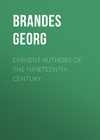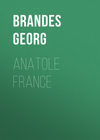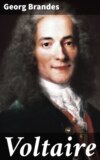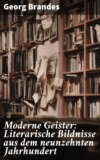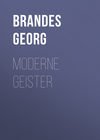Loe raamatut: «Eminent Authors of the Nineteenth Century», lehekülg 19
II
How did he become what in his first novel we learned him to be?
His father was a celebrated surgeon in Rouen, a strictly upright, and kind-hearted man, who brought up his son independently and well. That his first home was the house of a physician is felt in his books. He studied medicine himself for a little while, later took up the study of law, but even in his school-days cast himself passionately into literature; and in this enthusiasm of his he met a friend of his own age, who became a friend for life, – the poet Louis Bouilhet. Without doubt there are autobiographical elements in the description of the friendship between Frédéric and Deslauriers in his novel, "L'éducation sentimentale." Flaubert, like Frédéric, went to Paris when nineteen years old, to pursue his studies. His father purchased the villa Croisset at Rouen, which he afterward inherited; he passed his life alternately in Rouen and in Paris, a life in which there were but two external events, – a journey to the Orient, which he undertook when he was thirty years of age, and a later journey to northern Africa, which preceded the completion of "Salammbô." In Rouen he took delight in shutting himself up for months at a time, to study and to write; in Paris he chiefly sought diversion. He was in youth persevering in his labors and violent in his pleasures.
His temperament corresponded to his exterior. I only saw him in his later years, and then I had but a cursory view of him. But no one could forget this large-eyed, blue-eyed Hercules, with his rosy-hued complexion, his high, bald brow, and his long mustache, which concealed the large mouth and the vigorous jaws. He carried his head high and slightly thrown back; his abdomen protruded somewhat. He was not fond of walking; but he inclined to violent gestures; and he beat the air wildly with his arms, when hurling forth monstrous paradoxes in tones of thunder. Like all blustering giants, he was good-natured. His wrath, says one of his friends, boiled over and fell like milk.
He had, indeed, grown up at the time when the French romantic school was in its prime. He had received his first stamp from this school, and retained traces of it in his style and in his manner of abusing the bourgeoisie, which recalled Théophile Gautier's "truculent" form of speech, as well as in his mode of dress. He was fond of wearing large, broad-brimmed hats, enormously wide pantaloons, and coats that were made to fit tight at the waist. In the summer time he went about his own dwelling in broad, white and red striped breeches, and a sort of jacket that made him resemble a Turk. There was a report among his friends that the citizens of Rouen, when preparing for Sunday excursions into the country, would promise their children to let them see M. Flaubert in his garden if they were good.
I said that some journeys were the main events of his life. Women have taken less place in it than in the lives of most men. He had, when he was twenty years old, loved them as a troubadour. At that time he had repeatedly walked several miles in order to kiss the muzzle of a Newfoundland dog that a lady he admired was in the habit of caressing. Later he accustomed himself to a more matter-of-fact mode of contemplation and practice in erotic matters. He was a friend of anecdotes and stories of the manner of Rabelais, and in his books the erotic illusion was grasped by him with quite as hardy hands as all other illusions.
Nevertheless, in this point, as in so many others in the character of Flaubert, there was an abiding duality. He, the old bachelor, the passionate tobacco-smoker, who held intimate, friendly relations with men alone, and who felt at ease in no other female society than in that of certain pretty but not over-fastidious ladies, – held the belief, apparently the result of personal experience as well as of a deeply rooted abstract conviction, that it was the natural, so to say proper, thing for man to cherish for life one grand amatory passion, which must forever remain unrequited.
Fully in accord with this, we find in a letter to a lady, dating from the last year of Flaubert's life, the playful, yet at the same time mournfully true, words: "We poor laborers of literature! Why is that denied to us which is so readily granted to commonplace people? They have a heart! We have none at all! So I repeat to you once again that I, for my part, am an uncomprehended soul, the last grisette, the sole survivor of the old race of troubadours."
This "uncomprehended soul," however, was not in the habit of turning to women for comprehension. He dreaded love as a danger and a burden. Friendship alone was to him a religion, and among his friends there was no one who stood so near to him as that first and enduring friend, Bouilhet.
I do not exactly know if there have been times that were especially propitious to independent minds. But this much I do know: these two young men, who stepped forth into life when the bourgeoisie under Louis Philippe had gained the dominion and acquired a poetic expression partly from the feeble and righteously inclined École de bon sens, and partly from the "Vaudevilles" of Scribe, found the period it was their destiny to live in, the worst of all times. The romantic school had outlived itself and produced its own caricature. It was the fashion everywhere to praise common sense and to deride poesy. Inspiration and passion were out of date, and consequently laughable. Everything that was not commonplace was found tiresome. The two youths conceived the age in which they lived to be that of the sway of mediocrity and of the commonplace; they saw the victorious mediocrity, like a monstrous black water-spout, absorb all things, and whirl all things away with it.
This gave them both a fund of melancholy and deep earnestness, an under-current of contempt for humanity, a sensation of spiritual isolation, and through it an inclination for productions of an impersonal, objective kind.
III
As the result of such a frame of mind it was that Flaubert, in mature manhood, resolved to come forward as an author, and wrote "Madame Bovary." There was wafted from this book a breath of icy coldness. It seemed as though the author at length had succeeded in drawing forth the truth from the deep, cold well where it had been lying, and as though it were now standing on its pedestal and freezing, having brought with it all the cold, shuddering horror of the abyss. A singular book, written without the slightest degree of tenderness for its subject! Others had depicted the simple life of the country and of the province with melancholy, with humor, and at least with that attempt at idealizing which contemplation from afar is apt to bring with it. He regarded it without sympathy, and represented it as insipid and spiritless as it was. His landscapes were devoid of so-called poetry, and were painted briefly and yet completely. In his severe, masterly style he contented himself with reproducing the chief outlines and coloring, but gave thus an accurate presentation of the landscape. And he was wholly without tenderness for his principal character, a rare phenomenon in a poet whose principal character is a young, beautiful, and exceedingly attractive woman, who passes her life in yearning, languishing, and passionate desire, who errs and is deceived, is ruined, and finally perishes without properly sinking beneath the level of her surroundings. But every dream, every hope, every delusion, every naïve and unhealthy desire that floated through her brain was investigated; and brought to light without agitation, indeed with an overwhelming irony. There was scarcely a phase of her existence in which she failed to appear ridiculous or morally repulsive, and not until she dies a hideous death does the suppressed irony wholly recede, and she breathes her last, not as an object of sympathy, it is true, yet not as an object of contempt.
The author seemed thoroughly cold, even in the description of the hour of her death. That this appearance was deceptive is proved by a letter from Flaubert, which may be found in Taine's work, "De l'intelligence" (I., 94), and in which he says, "When I wrote the poisoning scene of Emma Bovary, I had so strong a taste of arsenic in my mouth, I was so thoroughly poisoned myself, that for two consecutive days I could digest nothing; indeed, I found it impossible to keep a morsel of food on my stomach." How deeply the author was affected, body and soul, was concealed in the novel, owing to the supreme self-control he had exercised while engaged on the work.
Throughout the entire book there appeared not a single personage with whom the author could possibly have anything in common, or with whom he could, in ever so slight a degree, be supposed to wish to change places. His characters were all, without exception, commonplace, unlovely, vicious, or unfortunate. Nor did he attempt the slightest deviation from the standpoint taken. The young wife, for instance, dangerous though her instincts were, in her yearning for the beautiful, her aspirations after the ideal, and her persistent faith in the romance of love, possesses attributes which, if portrayed differently, or with a more sparing hand, might have rendered the character noble, even in its errors. What would not George Sand have made of her! But Flaubert is determined not to fall into the old ruts, and so he assiduously robs the so-called fascinating sins of every trace of poetry. The betrayed husband, likewise, notwithstanding his lack of skill as a physician and his awkwardness as a man, is kind-hearted, patient, upright, and truly devoted to Emma, and thus has elements which, under other circumstances, might have produced a most touching effect. Moreover, he develops, at her death, qualities, such as profound attachment and self-forgetfulness, which a slight pressure from the finger of the author might have made seem significant and worthy of respect. But the creative artist refuses to give the clay this slight pressure; his love of truth compels him to keep the form within the limits that to him appear the correct ones, and so he permits Bovary to remain, from beginning to end, a good-natured, undignified, inefficient, and unattractive person.
There is in the novel but a single character with whom we are made to feel partially in sympathy, and that is the little apothecary apprentice, Justin, who adores Emma from afar. There is one situation, after her death, in which the author almost seems inclined to idealize him. When all the other mourners have left the churchyard, Justin draws near her grave, and we read: —
"On the grave among the fir-trees there knelt a weeping child, whose heart was ready to burst with the sobs that; shook his frame; and there he remained, in that shaded! spot, groaning beneath the weight of an immeasurable anguish, which was milder than the moon, and more unfathomable than the night."
We marvel to think that these lines have Flaubert for their author. But then we read in continuation: "Suddenly the wicket gate turned on creaking hinges. It was the grave-digger Lestiboudois; he came in search of his spade, which he had forgotten a little while before. He recognized Justin, as the boy clambered over the wall, and knew at once who was the offender that had stolen his potatoes."
This passage is the only one that remained in my mind ten years after my first perusal of "Madame Bovary," and it is a most admirable passage. It is not arbitrarily ironical, à la Heine; irony, in this case, is simply keen pénétration, the work of a versatile mind. It is quite natural that Justin should be stirred to the most profound and poetic emotions by the death of the lady whom he adored; but it is none the less natural that he should previously have stolen potatoes, and that the grave-digger should intuitively discover in the fact of his clambering over the wall of the churchyard an indication of his potato theft. But that Flaubert should have these two circumstances, these two sides of life, before his eyes at the same time, is proof of an intellectual vigor and a command of his subject which, as far as I am aware, have never before appeared in a similar form.
The artistic irony of Flaubert is here impersonal, necessary, true, and profound, in quite a different way than that of Mérimée. It is merely a stereoscopic view, by means of which reality is set forth in bold relief.
It is no wonder that at first people scarcely discovered anything else in the work than this mode of contemplation, and the fidelity to real life that was its product. If we leave out of consideration the brief period when the absurd notion was afloat that Flaubert was an immoral writer, it may safely be said that the prevailing idea concerning him was that he was what is called a realist. He copied the insignificant and the important with equal conscientiousness, but with an evident predilection for the commonplace and the morally repulsive; in fact, everything with him centred in one plan, vigorous but harsh. The admirers of the book found it a most remarkable work; the fault-finders pronounced the tendency introduced by Flaubert photographic, but not artistic. People expected, or rather dreaded, a new "Madame Bovary" from his hand.
But they waited for it in vain, for nothing further was heard from him. Years passed, and he still remained silent. Finally, after the lapse of seven years, he appeared before the public with a new novel, and the reading world proclaimed aloud its astonishment. This new book bore the reader far away from the villages of Normandy and the nineteenth century. The vanished author of "Madame Bovary" was found again amid the ruins of ancient Carthage. He represented, in "Salammbô," nothing more or less than Carthage in the days of Hamilcar; a city and a civilization of which people had scarcely any reliable knowledge, – a war between Carthage and the hireling troops of the city, which did not so much as offer general historic, or even so-called ideal interest. A Parisian novel, whose plot centred in violated marriage vows, had been looked for, and in its stead was received one whose scenes were laid amid ancient Punic culture, Tanit's worship, and Moloch adoration, sieges and battles, terrors without number or measure, the death of an entire army by starvation, and the slow martyrdom of an imprisoned Lybian chieftain.
And the strangest part of it was that all this subject-matter, about which no one knew anything, or could in the least control, this whole extinct barbaric world, was produced with a clearness and a minute accuracy that was in no respect inferior to that of "Madame Bovary." People discovered that Flaubert's methods were in no wise dependent upon the character of his materials, that they were the same in regard to this colossal, foreign subject as they had been in dealing with his former commonplace theme. He had played a prank on the public, manifesting in a striking manner how little he had been understood. Any one who had looked upon him as a realist servilely bound to the clod, could now learn how thoroughly at home Flaubert felt in tropical lands. Any one who had thought that the petty affairs of every-day life, in their ugliness and their absurdity, were the sole objects that had power to captivate him, must now discover that Flaubert in his youth had shared the enthusiasms of the men of 1830, and that he, as well as they, had been attracted by primitive passions and barbaric customs. Yet to how great a degree Flaubert actually entered into the sympathies and naïveté of the extreme romantic school, very few had the most remote idea, even after reading "Salammbô." The sun of Africa and the life of the Orient had been made hallowed to him by Byron and Victor Hugo, and his personal impressions in the Orient had only confirmed the poetic ones. The aroma of coffee gave him hallucinations of wandering caravans, and he swallowed the most horrible dishes with a sense of piety, if they but had an exotic name.
Flaubert had done his utmost to produce something that resembled ancient Carthage. He was artist enough, however, to know that the main point was not the outward truth, but the inner truth which makes probability. His descriptions were to many unconditionally convincing. A doubt concerning their conformity with a long since vanished reality, was once answered in my presence by one of the first critics in France with a simple "I am quite sure it is true." Flaubert himself came out openly and boldly against the doubters, in his defensive reply to an attack of Sainte-Beuve, with the following words: "I believe I have produced something that resembles Carthage. But that is not the question. I don't care a straw for archæology! If the colors are not harmonious, if the details do not accord, if the morals cannot be traced to religion or the occurrences to passion, if the characters are not well sustained, if the costumes do not correspond to the customs, or the buildings to the climate, then my book is, of course, untrue. Otherwise it is true."
These words hit the nail on the head; we are impressed by them with the master's good conscience and the authority with which it invests him. His work was not, as were so many later archæological novels, a masquerade, in which modern emotions and views of life are brought forward in antique costumes. No; everything here was on a par, and had the same wild, formidable stamp. Love, stratagem, revenge, piety, strength of character, all were unmodern.
The poet's love of truth was evidently as ardent and as vehement as it had been when he had written his first novel. Now, however, in the presence of this victory over death and the past, it seemed absurd to speak of Flaubert's photographing. Therefore this new book yielded a more correct standpoint for the "realism" of its predecessor. That Flaubert could not be classed among those who were copyists of accidental truth, became clear. It was seen that his accuracy of description and information was rooted in a peculiar precision of imagination. He evidently possessed in an equally high degree the two elements that constitute the being of the artist: the gift of observation and the power of investing with form. He had the bias and the capacity for the study of nature and for historic study, the scrutinizing eye which no relation between details escaped. To speak now of photography in connection with him was impossible. For study implies activity, ardor, and an eye for the essential; while photography, on the other hand, is something passive, mechanical, and totally indifferent to the distinctions between essential and non-essential matters. And Flaubert, furthermore, had the temperament of the artist, that condition of mind which heats red-hot everything acquired by observation, marking it with its own stamp, and which reveals itself as style through the impress given. For what is style but the sensated result of the temperament, the medium by means of which an author compels the reader to see as he has seen! Style marks the difference between the artistically truthful delineation and a good photography, and style is omnipresent with Flaubert.
No sooner had he collected his observations, and made his preliminary studies for a book, than they ceased, as such, to interest him. Thenceforth the chief matter of import to him was to write this book in perfect language. And language became everything, while the carefully prepared notes dwindled into wholly subordinate affairs. That he was accurate and reliable he was in the habit of declaring to be no merit on his part, simply the justice an author owed the public; for truthfulness, in and for itself, had nothing whatever to do with art. "No," he would cry, in tones of thunder, flinging out his arms as he spoke, "the only important and enduring thing under the sun, is a well-formed sentence, a sentence with hand and foot, that harmonizes with the sentences preceding and following it, and that falls pleasantly on the ear when it is read aloud." So he wrote very little each day, at the utmost not more than two or three pages, weighed each word in order to avoid repetitions, rhymes, and crude expressions, and relentlessly pursued a repeated word, even at a distance of thirty or forty lines; indeed he could not so much as endure the recurrence of the same syllable in one sentence. Often a single letter vexed him, and he would search patiently for words in which it was not found; sometimes he devoted considerable energy to an eager chase for an "r" when he needed a rolling sound. He always read aloud what he had written, singing it out in his stentorian voice, so that the passers-by would stand still in front of his house to listen. Many called him the advocate, and believed that he was practising a speech for court.
He suffered torments during his efforts to attain perfection. They were the pangs of childbirth which every author knows, but his were so agonizing that he was many times forced to spring to his feet, shriek aloud, and call himself a blockhead, an idiot! for no sooner was one doubt overcome than another had already arisen. At his writing-table he sat as one magnetized, wholly absorbed in his work, and lost in silent contemplation of his subject. Turgenief, who was his faithful and intimate friend, and saw him very often, declared that it was exceedingly touching to see Flaubert, the most impatient of mortals, so patient in his struggles with language. One day, after he had been working uninterruptedly the whole day at a single page of his last novel, he went out to take a meal, and when he returned late in the evening he thought he would edify himself by reading his page in bed; but alas! it failed to satisfy him. He sprang excitedly out of bed, – tall man of over fifty years of age as he was, – began to rewrite the page, clad in no other apparel than his night-shirt, and wrote and rewrote the whole night long, sometimes working at his writing-table, sometimes, when driven from it by the cold, continuing his labors in bed.
How he loved and how he cursed his language! Is it not highly characteristic that in "Madame Bovary" he only forgets himself and speaks in his own name in a single place, and that is in the passage where, in referring to Raoul's blasé indifference to Emma's declaration of affection, which proceeded from a genuine passion, however commonplace it may have sounded, he indignantly exclaims, "As though the abundance of the soul did not at times overflow in the most vapid similitudes, as though any one could reproduce the exact measure of his needs, conceptions, or sufferings, since human language is but a cracked kettledrum, upon which we hammer out melodies that sound as though they were played for a bear-dance, when it is our wish to move the stars!"
Such a lament from such lips is, nevertheless, what it declares human words not to be: the exact measure of the agonized striving of the great stylist for artistic perfection.
When an aspiration of that kind has once appeared in an art, it cannot become extinct. None of the initiated who have written after Flaubert, and who understood his literary ideal, have been able with clear consciences to make essentially smaller demands upon themselves than he made upon himself. Therefore the friends, the spiritual kindred, the disciples of Flaubert, are the most severe, the most original stylists of our century.
Not that Flaubert himself theoretically favored originality of style. He cherished a naïve belief in one ideal, absolutely correct style. He called this style, which he strove earnestly to realize, wholly impersonal, because it was nothing but an expression of his own personality, which had not occurred to him in what he had written.
Guy de Maupassant has wittily remarked that the trite saying, "The style is the man!" admitted of being reversed in Flaubert's case. He was the man who was the style. In other words, he was the personification of style. It is no unimportant or indifferent matter that the author who beyond all others represents the modern tendency and the modern formula of French literature, far from being an imitator of chance nature, or, as the reproach was usually worded, a photographer, was, on the contrary, an artist sans reproche.
